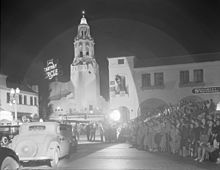| The Life of Emile Zola | |
|---|---|
 Theatrical release poster | |
| Directed by | William Dieterle |
| Screenplay by | |
| Story by |
|
| Based on | Zola and His Time 1928 book by Matthew Josephson |
| Produced by | Henry Blanke |
| Starring | |
| Cinematography | Tony Gaudio |
| Edited by | Warren Low |
| Music by | Max Steiner |
| Distributed by | Warner Bros. Pictures |
Release date |
|
Running time | 116 minutes |
| Country | United States |
| Language | English |

The Life of Emile Zola is a 1937 American biographical film about the 19th-century French author Émile Zola starring Paul Muni and directed by William Dieterle.
It premiered at the Los Angeles Carthay Circle Theatre to great critical and financial success. Contemporary reviews ranked it as the greatest biographical film made up to that time.
In 2000, it was selected for preservation in the United States National Film Registry by the Library of Congress as being "culturally, historically, or aesthetically significant."[1][2]
Produced during the Great Depression and after the Nazi Party had taken power in Germany, the film failed to explore the key issue of antisemitic injustice in France in the late 19th century, when Zola became involved in the Dreyfus affair and worked to gain the officer's release. Some recent studies have noted the film as an example of Hollywood's timidity at the time: antisemitism was not mentioned in the film, nor was "Jew" said in dialogue. Some explicitly anti-Nazi films were canceled in this period, and other content was modified. This was also the period when Hollywood had established the Production Code, establishing an internal censor, in response to perceived threats of external censorship.
The Life of Emile Zola became the second biographical film to win the Academy Award for Best Picture.
- ^ "Librarian of Congress Names 25 More Films to National Film Registry". Library of Congress. Retrieved 2020-11-23.
- ^ "Complete National Film Registry Listing". Library of Congress. Retrieved 2020-11-23.